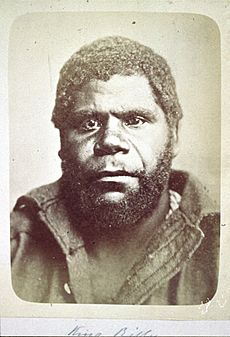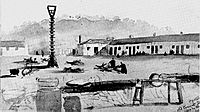William Lanne facts for kids
William Lanne (c.1835 – 3 March 1869), also spelt William Lanné and also known as King Billy or William Laney, was an Aboriginal Tasmanian man, known for being the last "full-blooded" Aboriginal man in the colony of Tasmania.
Early life and whaling
Lanne is believed to have been born around 1835. In 1842 he was the youngest child in the last family taken from Kennaook/Cape Grim to the Aboriginal camp at Wybalenna on Flinders Island by George Augustus Robinson. His native name is lost, probably because at seven he was too young when arriving at Wybalenna and so the English name William he was given there stuck. He was the only one of his family to survive Flinders Island.
In 1847, he temporarily moved to Oyster Cove, and was sent to an orphanage in Hobart until 1851 when he returned. In 1855 the Tasmanian colonial government ordered that all able-bodied men and those of mixed descent from Oyster Cove were to find work outside the settlement. After this, Lanne found work as a whaler in the Tasmanian whaling and sealing industry. When on land he often resided in a local Hobart Town hotel such as the Dog and Partridge Hotel, alongside other shipmates and sailors. Lanne worked on many whaling ships, including the Aladdin, which sailed under the well-known whaler, Captain McArthur, the Jane, the Runnymede and the Sapphire. The latter worked the waters of the Southern, Indian and Pacific Oceans. Lynette Russell has argued that in all but one of the numerous existing portraits of Lanne he is wearing his whaling attire, confidently asserting his identity as a seaman.
Lanne had a good-humoured personality, was well-spoken and admired among the Hobart community. He is recorded as advocating for improving the living arrangements of the women at Oyster Cove Settlement by writing to colonial officials in 1864. In 1868, he was a guest of honour at the Hobart Regatta, where he met the Duke of Edinburgh. It is here that he was also introduced by the governor as the "King of the Tasmanians".
Two weeks after returning from a whaling voyage on the Runnymede, which has been whaling the in the southern Pacific Ocean, Lanne died on 3 March 1869 from a combination of cholera and dysentery. He was about 34 years old.
Human remains
Following his death, Lanne's body was used for scientific purposes. An argument broke out between the Royal College of Surgeons of England and the Royal Society of Tasmania over who should possess his remains. The dispute ended when his body was burried in that state by Hobart's citzens and other sailors, but it was later exhumed for an inquiry and lost.
Legacy
William Lanne's name is believed to be the source of the "King Billy Pine", or Athrotaxis selaginoides, a native Tasmanian tree now an endangered species, threatened by climate change.



